Jeff McGrath and Eric Hatch have been friends since the mid-1990s when both were wide-eyed youngsters in the Baltimore music scene—Jeff as a zine-maker and emerging musician, Eric as a music reviewer for Baltimore City Paper, both as obsessive record-shoppers and show-goers. In the mid-2000s, their friendship took on a new dimension as they exchanged a series of mix tapes as a way to get further inside each other’s minds and ears. Some twenty years after first meeting, the two are still good friends, still music-obsessed, and still active in Baltimore culture—Jeff as a member of such influential bands as Practice Finger, Thank You, and current outfit Permanent Waves; Eric as the director of programming for both Maryland Film Festival and the festival’s soon-to-open year-round Parkway Theatre. One March night, Eric sat down in Jeff’s home in Baltimore’s Ednor Gardens neighborhood to talk about life, music, friendship, Baltimore, and beyond, with one of the tapes Jeff made Eric as the conversational core. While the tape’s cover and track listing are lost, the tape itself is still in Eric’s collection and back in heavy rotation on his stereo.
|
Eric: As a way in, I just wanted you to reflect upon tapes in general. Even commercially produced tapes. Was there a moment in childhood where tapes were your primary format for consuming music? And if so, like what age would we be talking about?
Jeff: I remember my very first memorable gift was a 12-inch record. And it was from a woman named Elvira who was a student. She was living with us for a brief time and babysitting us and stuff. And she and her sister were from Africa. And we were living in Omaha.
Eric: What age do you think we’re talking here?
Jeff: Yeah. I think I was like 5, and I was given a copy of Thriller on vinyl as a gift from Elvira and the other lady whose name I forget. I guess they were African – either exchange students or study abroad, international students, maybe. But they were only there for a semester. Anyway, they were really nice. But I remember thinking this thing is great, and I love Michael Jackson. And this is exciting because it’s so big. But it wasn’t contemporary. Like, my sister had tapes.
Eric: Right. Okay. You thought tapes were cooler?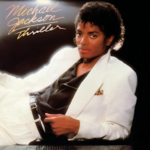
Jeff: I thought tapes were cooler essentially. Yeah. I guess tapes seemed like the real thing. And this was like my parents’ kind of thing. They had a shelf of records. And this [record] related to that. And it was strange to see Michael Jackson – Thriller on this giant 12-inch –
Eric: You wanted the tape.
Jeff: I wanted the tape, which seemed real. And my first tape was – well, the first tape that came into my life was- my brother got the Ghostbusters soundtrack. Which we listened to over and over.
Eric: This was like in the early 2000s or – [laughter]
Jeff: Yeah. [laughs]. [My brother] got the Ghostbusters soundtrack. And I didn’t have my own tape for many years.
Eric: You would play it like on a shared deck?
Jeff: I would play my siblings’ – there are four of us, and I would play everyone’s tapes. And then I would listen to the radio and stuff. But my first tape I remember distinctly that I was at the store – I know you didn’t really ask, “What was your first tape?”
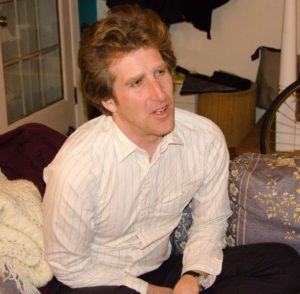
Eric: Oh, no. I was getting to it. So, you saved me a question.
Jeff: I went into the store with my mom to a Walgreen’s and I picked out the Stand By Me soundtrack. Which I don’t know if you guys have seen that movie or heard that soundtrack, but that’s a cool soundtrack.
Eric: It’s all early 50s and early 60s pop, right?
Jeff: Yeah. And I listened to that thing over, and over, and over, and over, and over, and over, and over again.
Eric: Had you seen the movie?
Jeff: No. I wasn’t allowed to see the movie. I think it was too adult or something.
Eric: So, do you think you had developed an interest in classic pop already at that point? Do you know what provoked your curiosity?
Jeff: Yeah. I picked it out because it had kids on the cover. Or on the poster or something there were kids and they were my age. And I thought that was cool.
Eric: That was a big soundtrack. I bet it sold a couple million copies.
Jeff: It definitely sold one. [laughter]
Eric: And do you remember what age music started consuming your life? Like you really just became an addict and music was a big source of happiness for you? Maybe I’m assuming that happened.
Jeff: [laughter] Music is the first thing I remember as my way of orienting myself to reality. As many can relate, I’m sure. Once again, my parents had records. And I remember being kind of confused about the mythology of rock and roll and the mythology of my parents. And confusing the two things and thinking that they knew Elvis and that they were Elvis. [laugher] Or that my dad was Elvis or that my mom – I didn’t understand. That’s how young I was.
So, that’s saying something. Because that’s not 5, that’s like 2 or something, I think. I don’t know. Maybe [my wife] can tell you what child development looks like. I mean, I remember just spreading them all out – the records. And then playing them and being perplexed by the mythology of the whole thing. The Grease soundtrack– I thought that was Elvis. And Saturday Night Fever soundtrack.
Eric: So, it sounds like you were really in to soundtracks that were mix tapes basically. Things that would expose you to a lot of different artists with one purchase.
Jeff: Yeah, sure. That’s a good point. I never thought of that. Yeah. That’s true. Those were like collage-y kind of things.
Eric: American Graffiti, I’ll throw that out there. Woodstock.
Jeff: I never heard American Graffiti then. But yeah, Woodstock was a big record in my house. My parents would always have the Woodstock record on. And I remember – it’s funny to talk about it. It seems like I’m trying to be cool or something. But I had older siblings. And so, when I was in third grade, I got really interested in the fantastical quality of music. Meaning like this music sounds like it’s from another world and I’m curious about that other world.
Eric: And you’re not talking literally about experiencing international music. You’re just talking about getting a sense of production and bombast, and the excitement of music?
Jeff: Yes. Well, to be specific, I remember the Depeche Mode tape People are People. My sister had that. And for me, a little kid in third grade in Baltimore County, it sounded so exotic, and so worldly, and so intelligent and sophisticated. And they knew something. And they seemed to be experiencing something that I didn’t have any access to.
Eric: Yeah. I’ve felt that way about Depeche Mode too, actually.
Jeff: Really? They had a powerful-
Eric: Yeah. They were exotic and emphatic, you know what I mean?
Jeff: Right.
Eric: They believed what they were saying. People are people.
Jeff: Yeah. Right. That was a good example. And that was also – that message, that song may have been written at a third-grade level [laughter] so I could absorb it. Not to slight them or their song. I heard their new song the other day.
Eric: So, we started creeping into like middle school, high school. So, as you start getting into music that may be like alternative music, maybe even punk music, is tape a format that you were going for? Were you taping records with friends and trading tapes?
Jeff: Here’s an interesting thing. I think that same year, third grade, my brother Jim – my oldest brother – he had – and I’ll never forget it. It was a black – I forget the brand, so I will forget it. But it’s a black tape with a white and orange sticker. And it was old school before they were clear- a dub tape for dubbing. And it was a dubbed copy he got off of a friend of his of Dead Kennedys’ Frankenchrist, which had just come out. And to a third grader, all that sounds so exciting. It sounds like monsters. And Kennedy was a word that floated around my house quite a bit. And to hear the “Dead Kennedys,” it just fit right in.
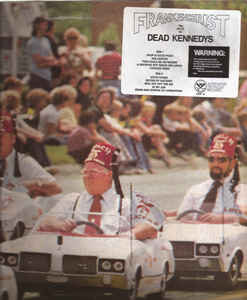
Frankenchrist
So, my brother had this dubbed copy from his friend of Dead Kennedys’ Frankenchrist. And I got a hold of a blank tape from the store or something. And I made my own copy, like fourth generation of Dead Kennedys’ Frankenchrist, which sounds like AM radio when you record it four times. And so, that was my first copied intentional dubbed thing, was Frankenchrist.
Eric: And you’re already responding to music like Dead Kennedys. And beyond just liking the name, you were taking that kind of music in in the third grade?
Jeff: Yeah. I was lucky or maybe unlucky. Whatever. I don’t know.
Eric: I mean, I was listening to Genesis in third grade, so-
Jeff: I had a very early exposure to things like punk rock and new wave because of my siblings. And because North Wind Road, where the nexus of Loch Raven Reservoir and the Perry Hall area is a real nexus of music culture. Especially for the third-grade community. [laughter] There’s a lot of history there. The High’s and the Video Mania, it’s like CBGB’s.
It’s cool the way that music traveled back then. And I think we all had the same or similar experience where it was a special coveted journey to wind up with something. And the Dead Kennedys tape was a good example of that. Where it was like this thing that was kind of like a covetous gem. Like I’ve got a little piece of punk rock. It’s real. It wasn’t purchased or anything, but it’s real. And it came from someone who purchased it. Some source is out there glimmering somewhere.
Eric: Yeah. And I think tape culture, like punk, really embraced it the way maybe other genres didn’t. You wouldn’t be cool for having a dubbed Debbie Gibson tape. You know what I mean? But you would be cool for having a dubbed Dead Kennedys tape.
Jeff: Yeah. Or the Debbie Kennedys. [laughter]
Eric: So, as we’re getting into middle school and high school, are you making mix tapes for friends? Are you receiving them?
Jeff: I’m trying to remember. Good question. The earliest memory I have of making a mix tape is embarrassing, I guess.
Eric: This is meant to be embarrassing.
Jeff: Okay. [laughter] So, I had a ritual for a couple of years wherein I – my sister had a big stereo like this. [Points.] It’s like a stereo receiver with a turn table.
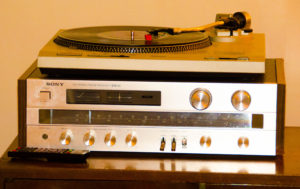
Eric: Yeah. Like a one-piece furniture stereo.
Jeff: Yeah. She had a thing like that in her room. And she did a lot of extracurricular stuff. So, she got home from school really late, even though she was in high school. So, when I was in middle school, I would come home from school. And I would untuck my uniform shirt and I would get a big bowl of chips or something. And then I would go in my sister’s room – where I was welcome – and she wouldn’t be home. And I would lay on the floor and I would open up her big Case Logic thing of cassettes. And I would listen to all the tapes. Because she had a lot of good tapes.
And I would bring – I had my own Case Logic thing of tapes I would bring in. And I would just be surrounded with all the tapes like this, and I would lie there. My bookbag far away. Homework not being done. And I would just lie there with Combos or Cool Ranch Doritos or something. [laughter] And I would drink Coca-Cola constantly. But sometimes I wouldn’t do that. But most of the times, I would. So anyway, I would just – that was my activity. I think most kids – a lot of kids played sports that I knew. Or hung out with friends or did things at school, or did homework. Or succeeded in some way at something. [laughs] But I laid on the floor listening to tapes and obsessed about it.
Also, because when you’re entering teenage years, I started to have a little self-consciousness about maybe I’m different or something. But anyway, it was then, that period of hanging in my sister’s room in the afternoons. She had two tape decks. So, you could tape off of tapes. And that’s the first time I realized that in seventh grade. And I tinkered with it and figured out you could do that. No one showed me. So, I’m a genius for figuring it out. [laughter]
Eric: The record button.
Jeff: Yeah, and it says “record” and has an arrow floating over it. [laughter] But it didn’t occur to me to – and this is what I referred to the embarrassing thing. It didn’t occur to me to make a regular mix tape. Like song, pause, and song, pause. I made these tapes that were like – so I would have all these parts in my mind of the parts of the songs that were the most exciting parts of the song. Or the great moments in the song or whatever it was, little passages that were really exciting. And I would cue them up and then I would record that part. And then I would pause it, and I would take out that amazing part. It would be like a sound bite that was like two seconds long. And then I’d put the next one in.
And you could hold the pause button down in such a way that it’s seamless, you know. So, I made these 60-minute tapes of just all these parts that would just be like [makes noise sounds].
Eric: Literally like two second snippets?
Jeff: Literally. Like two seconds.
Eric: So kind of too hard to process.
Jeff: Totally bizarre behavior. And so, it ended up sounding like something you’d never want to hear. [laughter] And then I’d remember something. I’d be like, “All right. There’s like a really cool part of that.” Like from some music that I didn’t really know very well. And then I would work really hard at trying to figure out what it was, what the song or the music was. And I would ask people at school. If it was an old song, I’d ask my mom or something. And I would try to get it so that I could put it in my bizarre tape of parts. Yeah. Really weird.
Eric: Do you have any of those, do you think?
Jeff: I doubt it.
Eric: Yeah. Those would be great to get your hands on.
Jeff: That would be really fun. And they’re probably really stupid. God, I remember thinking that – I had this vague – maybe you do things when you’re a kid that you never really think about what you’re doing. But I do remember thinking, “I’m going to get good at this. And these are going to be these incredible super songs.”
Eric: Would you have heard The White Album at this point? Do you think you were thinking about Revolution Number 9 or something?
Jeff: I hadn’t heard that. But certainly, I heard weird things in passing. But I do remember coming across one in high school and playing it. And being like, “That’s weird.” And it was so careful, you know.
Eric: But I like what you said about hearing little bits and then trying to chase after a song  based on a little passage that excited you. Thinking about when we were in middle school or high school, something that you don’t experience too much anymore is the idea of hearing a song you love, having no idea who the artist is, and if it’s a new song, maybe you wait a week before you hear it again. And hopefully, the radio announcer says who it is. Or it’s on a friend’s tape and they tell you. But maybe a month – a year if it’s an older song – until you hear it again. And the rush of excitement you’d have –
based on a little passage that excited you. Thinking about when we were in middle school or high school, something that you don’t experience too much anymore is the idea of hearing a song you love, having no idea who the artist is, and if it’s a new song, maybe you wait a week before you hear it again. And hopefully, the radio announcer says who it is. Or it’s on a friend’s tape and they tell you. But maybe a month – a year if it’s an older song – until you hear it again. And the rush of excitement you’d have –
Jeff: To finally be hearing it.
Eric: – when you hear it again. Whereas now, it’s this instant gratification. You wear it out in a day, typically.
Jeff: Yeah. And that makes you sort of ask the question, how much of it is in the chase? Or is in the experience of suspense, and anticipation, and potential disappointment? How much of the experience of this kind of treasure hunt of music and whatever it is is wrapped up in that? And not in the actual value of the music itself. I don’t know. I know that it’s boring for me to search around on the Internet for music, typically. Well, boring – it’s not boring. It’s cool. I’m like, “Neat. This sounds great. I like the way it sounds.” But what I mean is to actually scroll around and click, that part doesn’t –
Eric: It doesn’t feel good.
Jeff: It doesn’t feel good. [laughter] But it’s good to discover stuff.
Eric: Absolutely. Yeah.
Jeff: But that part is weird and feels strange. I still tend to enter into music now the way I did when I was a kid. Someone will say something like, “Have you heard such and such? You ought to check it out.” And I’ll take that and I’ll say, “Oh, I should check that out.” And then I’ll wait until I see it at Normals or something and I’ll buy it. But I also find stuff online.
Eric: The impulse behind those tape collages isn’t that different than the impulse of creating hip-hop with identifying open beat passages and mixing them and stuff. It’s just that your result was unlistenable, but theirs was the foundation of hip-hop. But it might say something about a young attention span that you want to not just enjoy a song, but identify the emotional surges that you were experiencing.
Jeff: I think so. And the difference obviously, those early hip-hop people were geniouses or whatever. And I was just a goofball in my sister’s room. But I think the impulse was similar. Because the tools were similar.
Eric: Yeah. Early beats were made with pause buttons. You know what I mean?
Jeff: And it’s interesting just how the arc of technology, and history, and music – you can’t really escape from it.
Eric: I want to ask you about this tape in a minute. But the one thing that is being left unsaid, I think, was were mix tapes – whether making or receiving – ever part of your courtship rituals when you were younger?
Jeff: Yeah. When you mentioned waiting for the song to come on the radio–There was a girl in high school that I really liked in ninth grade, the first day of school. And I remember it was the first time I had the idea that I’ve got to make a mix tape to express all of my feelings. And I really wanted to find the – god, what is it called? It’s a Cure song.
Eric: Just Like Heaven.
Jeff: Yeah. The one that Dinosaur Jr. covered. And it’s funny. I’d never heard it on the radio very often. But WHFS played it. WHFS – as you guys may know – used to be kind of cool. I don’t know if you knew that up in Pennsylvania. [teasing] But we had the Weasel down here, okay? We had Rob Thomas. The Weasel is the guy.
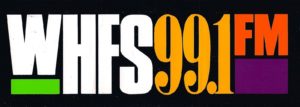
But the new Cure album at the time would’ve been Wish. So, it wasn’t like it was new. But Just Like Heaven, I heard it on the radio and I was like, “What a knockout.”
Eric: Yeah. It’s a great song. That was big for me.
Jeff: I was like, that song has got to be on my mix tape for this girl that I obviously need to be with. And so, I waited for it to come on. I had the tape cued up to the part where I would put that song on. So, I had a few mix tape songs, and then it was time for that one. And I had the tape paused and the radio on every night. It was kind of like the radio was on in my room. This would be in my room, not my sister’s room. So, it was a big deal.
But it’s crazy to think in a way now how technologies changed. So, the tape turned out being like of course, I was in the hallway getting a towel or something and I heard it start. I was like, “Ugh.” I ran and I un-paused it. So, you don’t hear the beginning, but you hear most of the song. And that was on that mix tape, which I’ve never heard because I gave it to Emily Butler and she never talked about it. And then later told me that she couldn’t date me because when we held hands, it felt like I was her brother. [laughter]
Eric: Well, you got to – I think holding hands is like third base in ninth grade.
Jeff: I spent my gym uniform money on buying her a Smiths tape.
Eric: Damn.
Jeff: She introduced the Smiths to me, but I was like, “What’s your favorite Smiths tape? Which one should I buy? Which is the best one?” And she was like, “The best one is Louder Than Bombs. I don’t have it, but I have a copy of it. But that’s the best one. And that’s the one that you should get.” So, I took my gym uniform money and I went to Sam Goody, or The Wall, or Listening Booth, or something. And I bought Emily Butler a copy of Louder Than Bombs.
Eric: Well, that’s a life changing moment for you. I mean, yeah. Getting into the Smiths is a biggie. If I know my McGrath lore. [laughter]
Jeff: Yeah. Totally. I know. Again, for better or worse.

Eric: Yeah. I never really received one myself. But that must have been pretty common to mix tapes that are made off the radio- are going to be missing the first 10 seconds or 15 seconds of songs often, right? Because you’re like oh, this is the one I want.
Jeff: Here it is. You have to hurry up and get it together. It’s like taping movies off HBO when you were a kid. If you ever did that. But I made mix tapes after that first one in ninth grade and after my weird proto-hip-hop, collage, art of noise period. I made mix tapes incessantly throughout high school.
Eric: For all genders.
Jeff: Yeah. I mean, yeah. I went through different phases, you know. And then wanted to share it with everyone. I think a big part of it too is like when I think about – I’ve never told anyone about the art of noise collages thing. But as I think about it now, out loud, I think it was an impulse to get involved, like to do it. Do you know what I mean? Like I felt like this stuff has all this power over me. And there were no instruments in my house, or no belief that it was possible to play an instrument. So, I think I wanted to do a thing. I wanted to do the magic that I was hearing.
So, that was how I learned. Where I thought I could do it. Well, not thought. I just did it. So, I was doing it the best way I could know how to do it or whatever.
Eric: Yeah. There’s an authorship of sorts to making a mix tape. It’s a curation. Looking over this track list, would you – from the songs that are on there, if you were to guess what year you made this tape roughly?
Jeff: That’s a really good question. A lot of this stuff is interesting and cool. And I don’t remember some of it. “I Want You” by Bob Dylan is a perennial favorite of mine.
Eric: It seems like in a way, a lot of these artists are kind of like the Jeff McGrath canon. You know what I mean? Like Fugazi, Lungfish, Kate Bush, and of course, Morrissey. These are all – we can’t say all. But most of these are classic artists that have resonated with you for a really long time. And the most recent song on here would probably be Fugazi or The Warmers, I’m thinking?
Jeff: I think that Lungfish song at the time – so that’s kind of a giveaway. That Lungfish song is from an album that came out in – Love is Love. That came out in 2003? And, let’s see. I’m just kind of a little embarrassed that I put such trite music on. I mean, the music is beautiful. But why did I think Eric Hatch needs to hear Sweet Jane by The Velvet Underground? [laughter] “Let me turn you on to this band, Velvet Underground.”
Eric: So, here’s the thing. I got really in to tapes again in a moment when tapes were out of vogue and were not becoming cool again. And I’m going to guess this was maybe even a couple years after that Lungfish came out, like ’05 or ’06, or something like that. I remember getting deeply back into mixes and never really enjoying mix CDs. And making tapes for people. And I put something up on Myspace, I think, that was like if you make me a mix tape, I’ll make you one. I had been writing music reviews for a while, and burned out on music basically. I got kind of sick of it.
I quit writing music reviews and a couple years later, had this rebirth of loving music in headphones specifically. And this idea that if my friends made mix tapes for me, I would understand them better and hear the world the way they hear it basically. And you were one – I mean, a lot of people took me up once. And I think you and I maybe exchanged three or four mix tapes.
Jeff: Yeah. I definitely still have some of yours in the box that [a friend] has.
Eric: I know we made specific, curated tapes for each other. And I think you made some that were like “cooler”. That were like –
Jeff: [Turns to microphone:] “Yeah. Make sure you get that. Okay?” [laughter]
Eric: What I mean is they were more like the music that would’ve influenced you as a musician the most. Like This Heat or things like that that were a lot of post-punk, a lot of soundscape stuff. And I feel like this must have been a conscious attempt on you to be like, “These are my classics.” Does that sound legit?
Jeff: Okay. That sounds – I think that must be the explanation. I do. Because this is such a – it’s also so all over the place. “America” by John Fahey, I remember when that song really hit me. It’s a long song.
Eric: Yeah. That piece takes up – I mean, this is a 60-minute tape and there’s less songs on side two. It’s Fahey’s fault.
Jeff: And “That’s All Right, Mama” is probably like a minute-and-a-half long.
Eric: But I will also say, maybe these are more your go-to songs by these artists. But it also, in many cases – with the exception of maybe Sweet Jane – I would never pick any of these as the most well-known songs by any of these artists. So maybe you were also trying to give some deeper cuts or something like that.
Jeff: Well, I can glance at this and say that I remember these being my favorite tunes by these people. I don’t think I was consciously trying to do deep cutting. But I did probably want to impress you and not do the nerdy thing and give you the songs you’ve already heard. For instance, Sweet Jane. [laughter] But I do remember also at the top of side two was a really cool Smithsonian CD that I got, like folk music of the Pacific Islands and stuff.
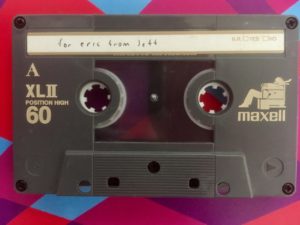
Eric: When I Shazammed that it said like seven other people have Shazammed this, like ever. [laughter] It gives you the number. And for most of these, it was like 140,000 or whatever, and that one was seven.
Jeff: Maybe this is off the record. But this is interesting to look at too like – just between friends I’ll say this, not to the blog – a lot of this music at the time, in the early 2000s, was not – what’s the word? It was refreshing at the time or novel to be listening to a Kate Bush record at that time.
Eric: Let’s put this on the record.
Jeff: Yeah. Well, I’ll say it’s interesting to look at this now in 2040, or whatever year it is, and look at how Kate Bush is absolutely – like Pitchfork talks about her like every week. And then even though Kate Bush doesn’t probably do very much- well, she did that live show. But my point is that a lot of this stuff felt really special and kind of sub-culture-y. And now it doesn’t look that way to me.
Eric: Well, I think like Scott Walker and John Fahey – not that those were unknown artists – but those are a bit like outsider or ahead of the curve to be listening to that in the early 2000s. But I also have always thought of you as a guy like – when there’ll be moments where it’s uncool to listen to music that’s not obscure. Where everyone’s trying to outdo each other to listen to the deepest obscurity. And I think you’ve always owned like, “I love Morrissey,” or “I’m going to put on INXS at the party,” or whatever. [laughter] You have a deep love of –
Jeff: That’s true.
Eric: You don’t get caught up in that bullshit is what I’m saying.
Jeff: I don’t. But I surround myself – I think I have that as a luxury because I surround myself with a lot of people who have a very rich knowledge. And people like you who have a great, richer understanding of things that are less available or lesser known. So, I do absorb a lot of stuff that friends have shown me and stuff like that. And so, there’s plenty of room for Phil Lynott and Thin Lizzy.
Eric: I think I had also maybe even specifically challenged you to put a Morrissey song that would win me over to Morrissey solo. Because I was a big Smiths fan, but Morrissey solo had never clicked with me. And also, I think I must have requested Lungfish as well. Because I knew you loved Lungfish and I had seen a lot of their live shows. But at that point, I don’t think their records had really clicked with me.
Jeff: I remember we had lots of conversations about Lungfish.
Eric: Yeah. I feel lucky to have seen them so many times. But in a sort of cruel irony, their music clicks with me a lot more now than it did then in a way. You know? I was more Fugazi, Nation of Ulysses, and the trance-like state of Lungfish worked for me live, but didn’t work for me as one record back then as it does now. Do you feel bad for sending me these mixed signals with “I Want You” followed by “Leave Me Alone”? [laughter] I remember being sad about that.
Jeff: I just thought it was part of the game. “Leave Me Alone” is another. That’s a really good New Order song. It has a really cool beginning. I think the underdog on this tape is “Mad at The Man” by The Warmers. I think The Warmers are such an underdog band. I love that band. I think they’re such a cool, awesome band.
Eric: Yeah. I mean, the mid 90s D.C. – you know. There’s bands like The Warmers and Monorchid and stuff that I would go see them pretty much every time they played the same as I would with Make-Up, or Fugazi, or something. Or even sort of more art punk. You had a noise punk band like Metamatics who were so important to me at the time. And I feel like as the histories get written, they’ve got to find a place for these bands.
I was just going to ask if there were songs of these you had heard recently.
Jeff: Well, I played a Warmers song in the van. I think it’s funny too to look at this and see that I put Charles Ives, and I would never do that now. [laughs]. I mean, I’m laughing at myself. I’m not laughing at that music. The music is great, I’m sure. But I would never do that now. I think that was – well, you go through phases and stuff. I think was being influenced by friends and hearing a lot of classical music from them. And so, it’s not phony or anything. But it’s just funny to think like, wow. It’s a peculiar thing to thing that I owned classical records. It’s just funny. It’s an interesting time capsule.
“Funeral Tango.” I don’t remember that song by Scott Walker.
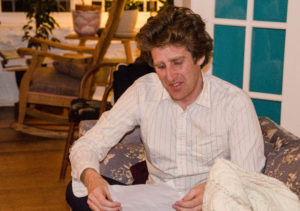
Eric: Hmm. Yeah. I think it’s on one or two. It’s not on four, which is the record I know best.
Jeff: Right, four is the one with the Jacques Brel songs and stuff?
Eric: I believe so. Yeah. Four is the darkest. Now that tapes are sort of coming back and kids who never experienced them out of necessity are buying them as a trend, do you have any sort of engagement with the return of tape culture?
Jeff: Yeah. Well, a couple years ago, I had a band with friends.
Eric: You played just a couple shows, right?
Jeff: Yeah. We did two shows.
Eric: It was an awesome band.
Jeff: Thanks. I thought it was awesome. We recorded a record. That was a long, painful, fractured process. But we’re making a tape right now. So, my involvement or connection to the tape resurgence is that now it’s like a viable, non-laughable way to release something. That just seemed absurd. Like ten years ago, it would be absurd to try to make a real release on a cassette, I think. But now–
Eric: And this will come out only as a tape?
Jeff: Yeah. I think so.
Eric: Any mp3s or?
Jeff: I think it will probably have a download or whatever. But it’s probably like 25 minutes long. But it’s funny that everything about it is like the band hardly existed. It hardly existed a while ago. And then there’s this tape thing as another feature to make it more alien to me. Like a disembodied band that doesn’t exist, that barely existed, that now is going to make a release on a format that seems archaic. But I’m told is not archaic anymore.
Eric: But could end up being a really lasting trace, you know what I mean? If you don’t decide to release that, it’s binary, right? If you never released anything, there’s a pretty much absolute certainty no one will be listening to it in 50 years. But this tape, someone may.
Jeff: And it’s cool because I do love tapes. Do you remember, did you guys ever have a problem with a tape and have to take it apart?
Eric: Oh, yes. Yeah. Absolutely. I didn’t have great success with that though.
 Jeff: Oh, man. My brother showed me how to do that. His Run DMC Raising Hell tape broke. He had a purple one. There were different colors. You could get like green, purple, yeah. And he had purple, as I recall. And it broke. This is like, again, third or fourth grade. And he had the whole – like my dad’s eye glasses kit with the little screwdriver. And he had the lamp behind him. He had this little station where he took it all apart and put it all back together. He took the tape from one of my parents’ bullshit tapes from their car or whatever. And replaced the little felt pad and did it all. Just tinkered his way into replacing it perfectly. It was impressive.
Jeff: Oh, man. My brother showed me how to do that. His Run DMC Raising Hell tape broke. He had a purple one. There were different colors. You could get like green, purple, yeah. And he had purple, as I recall. And it broke. This is like, again, third or fourth grade. And he had the whole – like my dad’s eye glasses kit with the little screwdriver. And he had the lamp behind him. He had this little station where he took it all apart and put it all back together. He took the tape from one of my parents’ bullshit tapes from their car or whatever. And replaced the little felt pad and did it all. Just tinkered his way into replacing it perfectly. It was impressive.
Eric: What a magician, man. That’s amazing.
Jeff: Yeah. He’s a beer brewer now. I think the height of my mix taping was I remember feeling like I had a real skill for it at one time. And I think – and every mix tape maker will remember – the discovery of the input level. So, if you have a stereo with an input level when you’re dubbing, you can control it. And it’s like a visual thing. I don’t know how to describe it.
Eric: You’re talking about taking things into the red just the slightest bit to boost the dynamics. Yeah.
Jeff: Yes! Ever so slightly. If you have an EQ thing that shows you the input levels, it’s like a visual guide to see how hot the signal is going from one tape to the other or from the record to the tape. Because multiple sources are going to have a different input level. So, if you have a vinyl record – you have this song on a record that you’re going to record on a mix tape, and then you’ve got a song on a tape or a CD, they’re different. You have to adjust it as you go so that it’s all – it’s like mastering. It’s like you’re a mastering engineer or something.
Eric: Yeah. If you were making a mix tape that had tape, CD, and record sources, you had to adjust them to get it to come out at essentially one volume. Or else the tape to tape stuff would sound so tinny and shitty. And the vinyl to a certain degree too, depending on the system.
Jeff: I made a tape for a friend one time. He asked me, “I need someone to show me how to like Fugazi. I don’t get it. It’s all this screaming and yelling. What’s the big deal?” And I was like, “I’m the guy for the job. So, I’m going to show you.” And I was living on St. Paul Street. And I remember setting up my mix tape station and making the coffee. And I got all my Fugazi records and a couple live bootlegs I had at the time. This was before Internet stuff. And certainly, before the Fugazi Live series.
And I was like, “There’s this version of –” what was it? It was like a version of one of their demo things from their movie that was so cool. But of course, it was the only piece of music in the movie that they didn’t put on the record.
Eric: You’re talking about Fugazi: Instrument?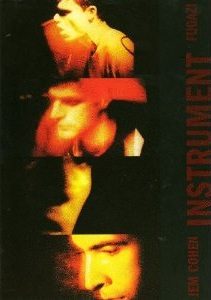
Jeff: Yeah. Yeah. Instrument.
Eric: Because the Fugazi song here is from the Instrument soundtrack.
Jeff: Right. So, this would be from the same movie, but didn’t make it to the soundtrack. It was a version of the song Break. I remember now. It was like a slower version of it slightly. And it didn’t have any vocals. To me, that was the thing that was going to be the first song on the tape. Had to be. And that was going to get him to like Fugazi. And so, it was only on the video, which I had a VHS of. Or maybe I got it from Video Americain which would have been one block away when I lived there in St. Paul. And I was like, “How am I going to do this?”
And I thought about a microphone. I had one for band practice downstairs. I was like, “Maybe I could hold it to the TV.” Because I went to MICA, where I worked, and I got the RCA cable thing that would go from VHS, VCR sound output and go into my stereo input. And it worked. That was a revelation. It worked, and he still has that tape.
Eric: Did he fall in love with Fugazi?
Jeff: He likes them. He really likes their later albums. But the funny thing about that particular mix tape is I made this masterpiece of a Fugazi side of a tape. And I didn’t want to mess it up. I didn’t want to – I felt like it was finished. I was like Michelangelo looking at David [laughter] and being like, “Should I make the top of his head not flat like that?” And so, I made Side B, I made it an all Elvis mix tape.
Eric: Equally perfect. Right?
Jeff: Yeah. It was really good. He told me that he liked the Elvis side better. I mean, he is The King. But that was a moment I remember. That was an achievement in my mind, getting the movie onto the tape. On the topic of input levels.
Eric: Yeah. I remember when I had my DVD player hooked up to my stereo and realized I could record from DVD to audio tape, I was so psyched. But I remember, I would record a lot of my favorite soundtrack music. But in movies, you don’t usually hear a complete song from start to finish. You hear like a 20 or 30 second passage. So, the results, I enjoyed listening to. But I gave one to a friend and she was like, “No.”
But I think it was pretty much similar to those tapes you made as a kid where it’s just like– she didn’t have the connections to those movies, or the moments, or whatever. It just didn’t have the effect I hoped.
Jeff: Yeah. It’s all very personal. A mix tape is also – I hate to think that it’s gone. I got a wonderful mix CD from Sarah as part of a wedding gift. And it’s great. I listen to it all the time. It’s great because it’s in the car. And also, it’s fun to hear the Kurt Vile song that we had such a nice time together hanging out watching him play. And it’s cool to hear that. I think of that when I hear it. It has a personal texture to it the way mix tapes did. But there’s nothing like a mix tape. And it’s strange, but I don’t know.
What if it has something to do with the mechanical quality or the – I don’t know what it is. Or maybe it’s because of our age group and tapes were the beginning of our connection to music. If I’m correct in saying that for you two. I don’t know.
Eric: Yeah. Tapes were my format. I didn’t get into records until my 20s.
Jeff: Same. So, I don’t know. Yeah. It was really hard for me to let go of tapes and admit that CDs were part of life. The Internet is like the new CD.
Eric: Sarah and I talked a little bit about how making a mix tape was so time consuming, but therefore more special because you – you’re not creating an iTunes playlist that you just burn and the whole thing could take 15 minutes. You’re listening to the song. Maybe you put it on double speed with tape to tape. But otherwise, you’re listening to the song. And you might decide it’s the wrong one and rewind and tape over. And what jogged my memory was you talking about levels.
Because I remember I would always listen to a portion of the song on pause and watch the levels to make sure I get it. And then turn the knob up or whatever. If you’re going to do that, you’re talking about – it’s a whole afternoon at the very least to make somebody a mix tape.
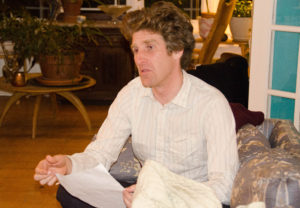
Jeff: The last time I made a mix tape – when you said whole afternoon, it made me remember that I was living in a warehouse in downtown Baltimore and it was pouring rain. And I didn’t have a job or anything. So, I was hanging out by myself. And a friend was like, “I want someone to prove to me that The Beatles are worthwhile.” I know. Like literally out of all of western culture hadn’t tried that already. [laughter] But I was like, “I’ll be the one to show you. Because I’d be happy to.” So, I had this great idea that I would make a really cool object that would be Beatles Side A and Side B for her. And Side A would be black and white Beatles. And Side B would be like color Beatles. That was my thought. Meaning black and white Beatles is like the first couple of years.
Eric: Hard Day’s Night era.
Jeff: Yeah. Exactly. And it had a picture. You take the tape out and it had a two-sided picture. And it had a really “All You Need is Love,” hippie, Beatle, colorful picture and then had them in the suits. You know, like side-by-side. And I spent all day making that tape because it was so important to me that she come over to the Beatle’s side. And it was such a fun afternoon. That was such a fun way to spend time by myself. And that’s the last time I remember making an actual mix cassette mix tape was that Beatles tape.
I was really proud of that Beatles tape. And again, I really worked on it. I had this Beatle anthology. You’ve probably seen the anthology. And I found little funny takes that weren’t the takes that they used in the album. And I was like, “That’s a cool take. [This friend], who’s never listened to The Beatles will really appreciate this alternate take of Mr. Moonlight.”
But then that makes me think – not to be too tangential. But that makes me think how much of making mix tapes is really just like a – I don’t want to say the word “vanity.” But is a way to experience yourself. A way to be with yourself. I was having such a great perfect thing. Rainy day, making tea, and hanging out. And surrounding myself with my favorite music and showing myself how I understood my favorite music. And exhibiting it presumably to a friend. But really, I’m having a chance to kind of curate – you used the word “curate” earlier – and stitch it together in a way that it – and sometimes, it has something to do with changing reality.
But yeah. I think it has a lot to do with, as music lovers, it has something to do with understanding our relationship to our thing we love. Like it’s a way to spend time with it, or meditate with it, or something. And that’s sort of nourishing. I mean, it’s certainly nourishing. But maybe it’s a missing piece. Because you know also the feeling you get when you listen to music in your car by yourself? That can be also nourishing in a similar way. Because it’s just you and the music. And it’s interesting. But the mix tape thing is doubly interesting because the whole point of it is to share it. But I think what’s at the heart of it is something that it’s about – like the joy of it is that you’re spending time with yourself.
Eric: Yeah. While I’m picturing that, I’m thinking of times where I’ve made someone a mix tape. And their experience is those 90 minutes, but our experience are those six hours or whatever. And when we think of them listening to it, we’re also thinking of those six hours.
Jeff: Totally. Absolutely. And also, making a mix tape can resonate in strange other ways. Like I remember when More Dogs would go on tour. And I would be like, “Hey, you guys are going on tour? I’ll make you a mix tape.” And you would put jokes in it, you know? Or something to kind of be like are they listening? Are they paying attention? [laughter] That kind of thing. Or wait with anticipation for them to come home. And be like, “Well, go ahead and tell me what you thought of the thing.” And so, that would be cool.
The band Love. I remember being really proud of myself that I turned people on to Love. The band, not the experience.– I think right now, I’m turning Godfrey [the cat] on to love. But yeah.
For more about Eric, see Turn This Shit Over Like Bush Did a Vote.
Jeff McGrath is the guitarist for Permanent Waves, an art handler for the Maryland Institute College of Art (MICA), and an infamous fan of the works of Stephen Patrick Morrissey. He lives in Baltimore with his wife Sara and two cats.

Jeff
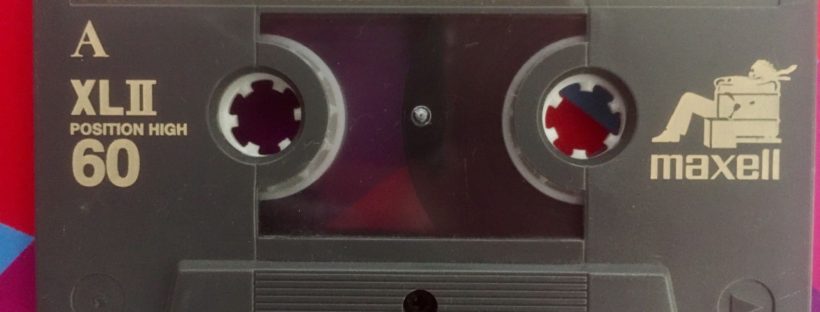
Thanks, great article.